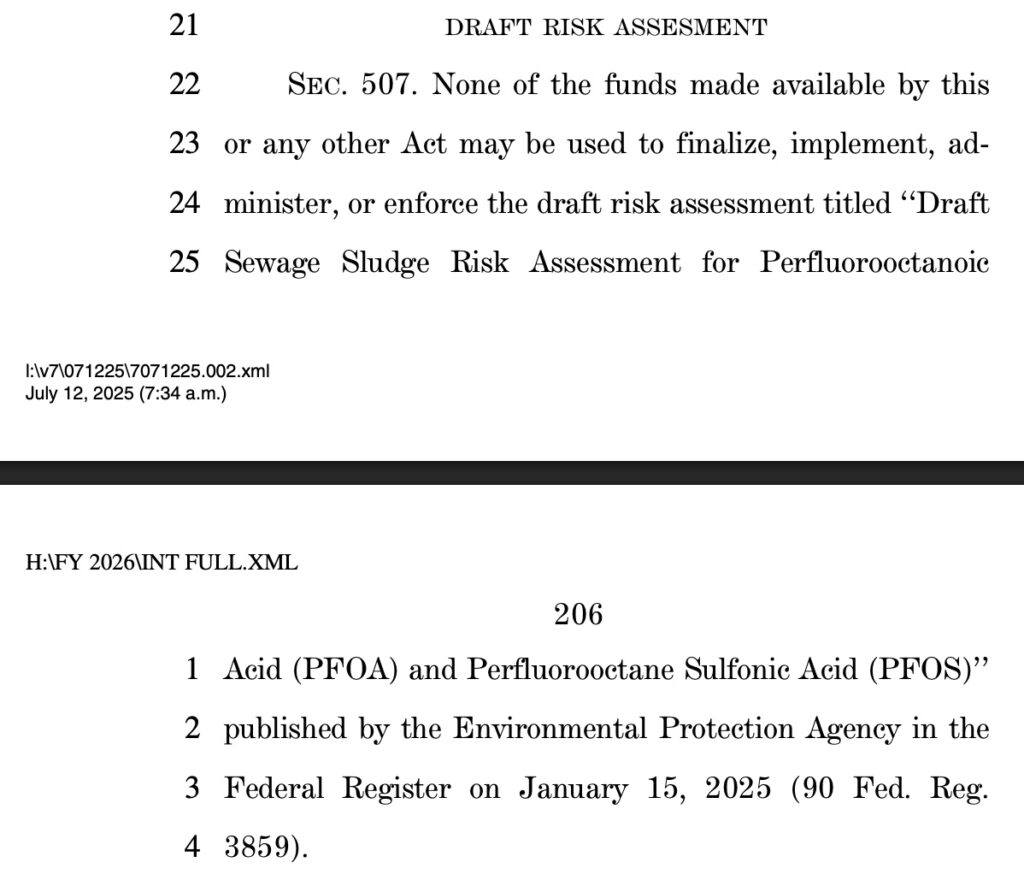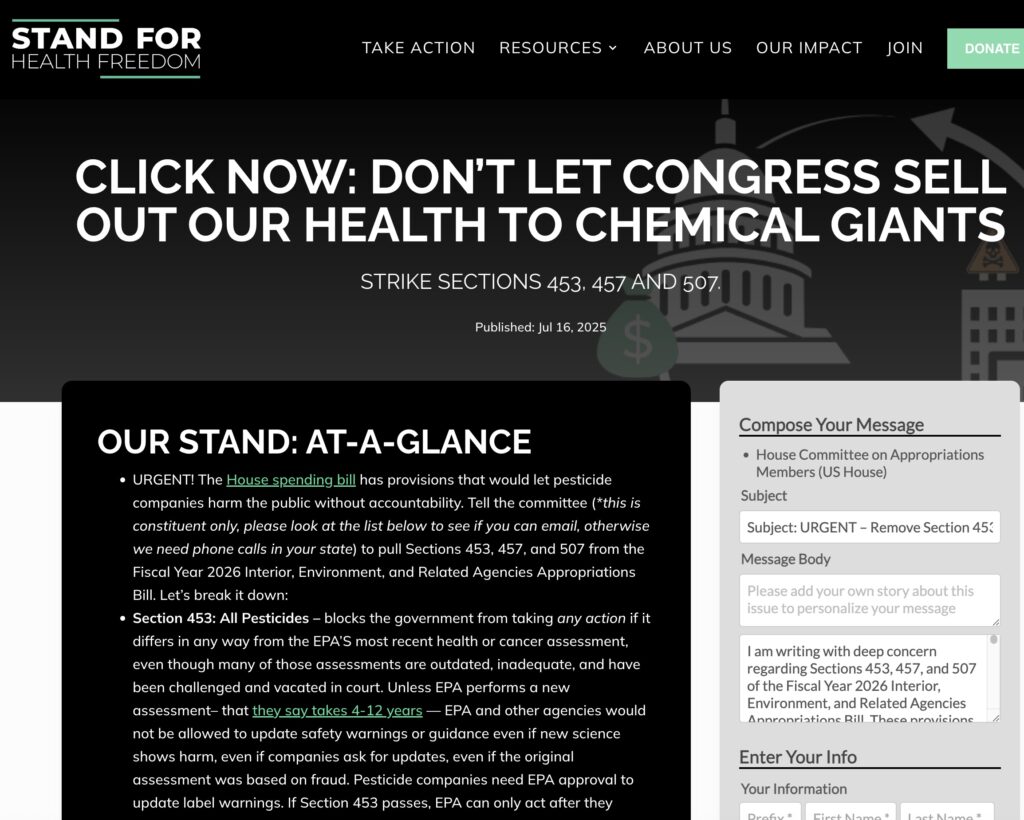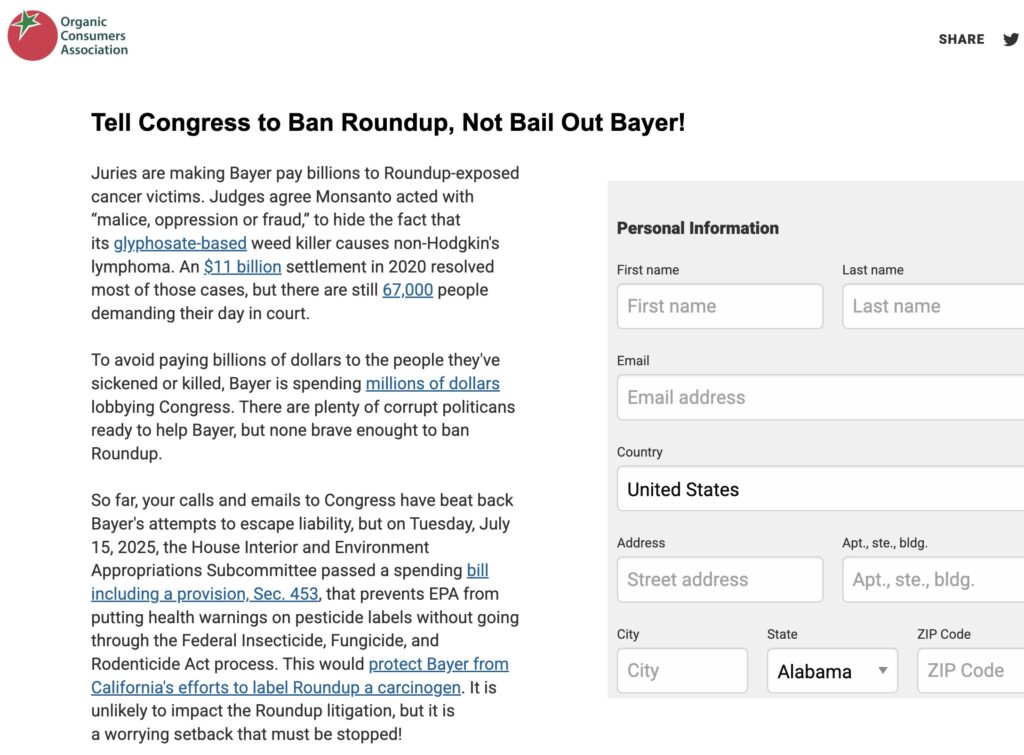Chemical industry is going for another shield for PFAS in sewage sludge (the biosolids in your fertilizer) in the same Appropriations bill. Call to stop both.
Stand for Health Freedom makes it easy to send emails as well as call. Do both!
Go to the Stand For Health Freedom website below to send an email to your representatives about the pesticide liability shield.
I just learned from them that the chemical industry is ALSO seeking a “Get Out of Jail, Free” card for Forever Chemicals (PFAS), probably because the EPA issued a draft risk assessment in January noting they were likely carcinogens. Here is the language, similar to Bayer’s rider, of Section 507.

Even though many farms had to be abandoned because these forever chemicals were spread on them in Maine and Connecticut, animals died, people died, but the chemical industry wants protection and hopes they can get it. Stop this rider too!
https://standforhealthfreedom.com/actions/section453/

Our Stand: At-A-Glance
-
URGENT! The House spending bill has provisions that would let pesticide companies harm the public without accountability. Tell the committee (*this is constituent only, please look at the list below to see if you can email, otherwise we need phone calls in your state) to pull Sections 453, 457, and 507 from the Fiscal Year 2026 Interior, Environment, and Related Agencies Appropriations Bill. Let’s break it down:
-
Section 453: All Pesticides – blocks the government from taking any action if it differs in any way from the EPA’S most recent health or cancer assessment, even though many of those assessments are outdated, inadequate, and have been challenged and vacated in court. Unless EPA performs a new assessment– that they say takes 4-12 years — EPA and other agencies would not be allowed to update safety warnings or guidance even if new science shows harm, even if companies ask for updates, even if the original assessment was based on fraud. Pesticide companies need EPA approval to update label warnings. If Section 453 passes, EPA can only act after they perform new assessments, and during all those years waiting for the new assessment, pesticide companies hide evidence, manipulate science, and deny, deny, deny, that their products are causing harm. And if they don’t like the outcome of a new EPA assessment, can sue to delay even longer.
-
Here’s the worst part: Section 453 creates a Grand Canyon sized gap between the duty of pesticide companies to warn consumers about all the risks posed by their products and EPA’s sole authority to approve labels.
-
Pesticide company attorneys already argue that it’s not their fault that their labels fail to warn, that the EPA won’t let them warn. Section 453 will give more weight to that argument in court, making it even more difficult for victims to hold pesticide companies accountable.
-
Let us give you a real life example: Monsanto buried evidence that Roundup causes cancer. Their EPA health assessment hasn’t been (successfully) updated since 1993, over 30+ years ago. Now they’re asking the Supreme Court to throw out cancer cases using that outdated EPA assessment as their defense. This is exactly why Section 453 is so dangerous, it locks in obsolete science and shields chemical companies from accountability. Congress must remove it.
-
Here is what’s at stake:
-
Delayed updates on “16,000+ pesticide products” which have outdated and inadequate warning labels
-
Families at risk of losing their right to hold companies accountable when their loved ones get sick
-
Our kids pay the price while chemical giants get more power and reduce meaningful food choice
-
-
If this passes companies can hide even longer behind EPA’s outdated and inadequate labels, even when they know their pesticides cause cancer, brain damage, and birth and developmental defects.
-
-
SECTION 457: Ethylene Oxide (EtO) – blocks new information on a widely used chemical and medical procedures. The EPA acknowledges pesticide ethylene oxide (EtO) is a dangerous carcinogen. Alternatives exist, but the medical industry is attempting to hold up new rules, using Congress to fight the expense of developing and transitioning to other safer methods to sterilize equipment, putting profits ahead of health and safety. Regulation of Ethylene Oxide (EtO) Under the Federal Insecticide, Fungicide, and Rodenticide Act (which would be negatively impacted by passage of Section 457).
-
SECTION 507: Sewage Sludge – cripples the EPA’S ability to protect us from “forever chemicals” in sewage sludge. People are exposed to this risk when they consume drinking water, fish, beef, milk, eggs, certain fruits and vegetables. EPA’S Draft Sewage Sludge Risk Assessment
-
Meanwhile, people keep getting cancer. Kids keep getting poisoned. Companies say you “can’t blame us, our product is safe, EPA hasn’t told us to warn anyone!”
-
ACTION: Tell the House Republican Appropriation Members – Don’t be Anti-MAHA! Don’t give foreign and domestic chemical companies a free pass to continue poisoning America. Remove Sections 453, 457, and 507. This campaign is for constituents only, so please check the list below to see if you’re included.
If you’re not a constituent, you can still take meaningful action, call the Congressman in your state below, and use this call script, “We need more transparency and more accountability when it comes to issues with our health, please pull sections 453, 457, and 507 of the house Appropriations Bill.”
Organic Consumers Association also has a handy form for emailing your reps:
https://advocacy.organicconsumers.org/page/10024/action/1
